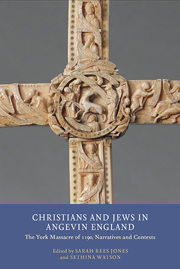Book contents
- Frontmatter
- Contents
- List of Illustrations
- Contributors
- Editor's Preface and Acknowledgments
- Abbreviations
- Introduction: The Moment and Memory of the York Massacre of 1190
- Part I The Events of March 1190
- Part II Jews among Christians in Medieval England
- 6 Faith, Fealty and Jewish ‘infideles’ in Twelfth-Century England
- 7 The ‘Archa’ System and its Legacy after 1194
- 8 Making Agreements, with or without Jews, in Medieval England and Normandy
- 9 An Ave Maria in Hebrew: the Transmission of Hebrew Learning from Jewish to Christian Scholars in Medieval England
- 10 The Talmudic Community of Thirteenth-Century England
- 11 Notions of Jewish Service in Twelfth- and Thirteenth-Century England
- Part III Representations
- Afterword: Violence, Memory and the Traumatic Middle Ages
- Bibliography
- Index
- York Medieval Press: Publications
9 - An Ave Maria in Hebrew: the Transmission of Hebrew Learning from Jewish to Christian Scholars in Medieval England
from Part II - Jews among Christians in Medieval England
Published online by Cambridge University Press: 05 May 2013
- Frontmatter
- Contents
- List of Illustrations
- Contributors
- Editor's Preface and Acknowledgments
- Abbreviations
- Introduction: The Moment and Memory of the York Massacre of 1190
- Part I The Events of March 1190
- Part II Jews among Christians in Medieval England
- 6 Faith, Fealty and Jewish ‘infideles’ in Twelfth-Century England
- 7 The ‘Archa’ System and its Legacy after 1194
- 8 Making Agreements, with or without Jews, in Medieval England and Normandy
- 9 An Ave Maria in Hebrew: the Transmission of Hebrew Learning from Jewish to Christian Scholars in Medieval England
- 10 The Talmudic Community of Thirteenth-Century England
- 11 Notions of Jewish Service in Twelfth- and Thirteenth-Century England
- Part III Representations
- Afterword: Violence, Memory and the Traumatic Middle Ages
- Bibliography
- Index
- York Medieval Press: Publications
Summary
An increasing emphasis on the otherness of the Jews in twelfth- and thirteenth-century ecclesiastical sources seems to coincide with a revival of the study of Hebrew among Christian scholars. While this revival, which forms part of a wider intensification of interest in language, rhetoric and the study of the biblical text, is visible all over Western Europe, scholars and texts of English origin are particularly well-represented in the extant source material. This chapter focuses on the learning process involved in this type of cross-religious language acquisition. Examining Hebrew and Hebraist texts from pre-expulsion England, it aims to reconstruct, in so far as this is possible, how and from whom its Christian readers learnt Hebrew, and what methods and reference tools they had at their disposal.
Sources
Hebrew did not yet form part of the curriculum at the schools and fledgling universities and those Christian scholars setting out to learn it seem to have been few in number. Their aim was to be able to read the Hebrew Old Testament, at least in part in the original language, for exegetical as well as polemical reasons. ‘This reading reflects the Hebrew better/less’ (‘hebreo plus/minus consonat’)’ is a recurring phrase in the work of one such Hebraist, Herbert of Bosham (c.1120–c.1194). His knowledge of Hebrew, which he claims to have learnt from an early age (‘a primis adolescentie annis’) enables him to revise Jerome's translation of the Hebrew Psalms against the Masoretic text and to challenge scribal errors and what he considers to be erroneous allegorical exegeses.
- Type
- Chapter
- Information
- Christians and Jews in Angevin EnglandThe York Massacre of 1190, Narratives and Contexts, pp. 174 - 183Publisher: Boydell & BrewerPrint publication year: 2013



